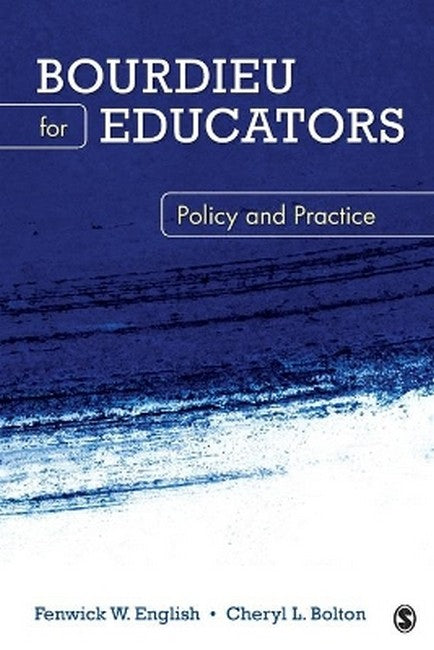Fenwick W. English (Ph.D.) is the R. Wendell Eaves Senior Distinguished Professor of Educational Leadership in the School of Education at the University of North Carolina at Chapel Hill, a position he has held since 2001. As a scholar/practitioner he has held positions as a school principal and superintendent of schools in California and New York and as a department chair, dean, and vice-chancellor of academic affairs at universities in Ohio and Indiana. He is the former President of the University Council of Educational Administration (UCEA) and of the National Council of Professors of Educational Administration (NCPEA). His research has been reported in national and international academic forums. He edited the 2006 SAGE Encyclopedia of Educational Leadership and Administration, the 2009 SAGE Library of Educational Thought and Practice: Educational Leadership and Administration; and the 2011 SAGE Handbook of Educational Leadership (2nd Ed.). In 2013, he received the Living Legend Award from NCPEA for his lifetime contribution to the field of educational leadership. Cheryl L. Bolton (Ph.D.) is the Academic Group Leader for Lifelong and International Learning in the School of Education at Staffordshire University where she teaches and directs a range of programs including educational research at the masters and doctoral levels. She formerly worked in industry before entering further and then higher education. Her doctoral research involved examining Bourdieu's key trio of concepts-- habitus, capital and field to investigate their influence and impact on instructors in Further Education programs in England. Dr. Bolton's research has been presented at the British Education Research Association ( BERA); the British Educational Leadership, Management and Administration Society (BELMAS) and the American Education Research Association (AERA).
Request Academic Copy
Please copy the ISBN for submitting review copy form
Description
Chapter 1: Introducing Pierre Bourdieu to Educational Practitioners Bourdieu's Biography Vielseitigkeit: What is Distinctive About Bourdieu Understanding the Nature of Pedagogic Work as Political Struggle The "Culture Wars" in the U.S. and the U.K.: Similarities and Differences The Battle Over the Correct Academic Subjects and Proper Pedagogic Work The Concept of Misrecognition and How It Works Some History with Misrecognition in the Past Building Awareness of the Forces at Play Without New Eyes: The Blinders of Doxa as Orthodoxy Bourdieu as the Public Intellectual, Activist and Provocateur Chapter 2: Unmasking the School Asymmetry and the Social System Bourdieusian Cornerstones Bourdieu's Concept of Habitus An Example of Neighborhood Habitus A Case Study of How Family Habitus Works to Shape Career Aspirations The Intersection of Class, Social Space and the Field An Example of a Field with Its Own Logic The Cultural Arbitrary The Plight of Minority Children Facing the Dominant Cultural Arbitrary in Schools How the System Works as a Game Who Benefits from Schools as They Are? Illuiso and Unquestioned Loyalty to Continuing Orthodoxies The Bounded Nature of Choice Within a Designated Social Space Educational Inequalities Must Remain Unnamed Connecting the Dots: The Importance of Family in School Success The Challenge of Reducing Social Inequality as an Educational Goal Chapter 3: The Curriculum, Qualifications and Life Chances The Three Forms of Capital Empirical Validation of the Impact of Social Capital on School Success The Power of Cultural Capital and Bourdieu's Own Experience as a Student Schools as Institutionalized Embodiments of Forms of Cultural Capital Capital, Power, Symbolic Violence, and Scholastic Habitus Two Recent Examples of Symbolic Power (Violence) with School Curricula Social Origin and School Success: Historical and Continuing Evidence of the Linkage Between Them Academic Failure as the "Fault" of the Student? Academic Credentials-Essential Capital? The Hidden Curriculum, Cultural Values and Schooling Success Calculating Life Chances: The Academic vs. Vocational Education Debate The Issue of the Mal-Distribution of Opportunity Chapter 4: The Shifting Control of Leadership Preparation The Construction of National Leadership Standards in the U.K. and the U.S. The Major Epistemological Steps Behind National Standards Core Technologies and the Reification of the Status Quo The Shifting Nature of the Contestation and Changer in Power in the Education Field The De-Contextualization of School Leaders via Job Standardization The Reformers Blinkered Vision for Change: They Just Don't See It Chapter 5: A Retrospective Look at Bourdieu's Impact The Social Field of Education is Not Static Education Is Simultaneously a Means and an End Schooling as the Cultural Arbitrary Demonizes Those who are "Otherized" The Dominant Consumer Culture in Education Undermines Its Moral and Humanistic Value Educational Reform Will Always Benefit and Advantage the Reformers The Dilemma of School Leadership, Agent of the State or of Humanity?
The book is excellent. Dr. English and Cheryl L. Bolton do a masterful job in explaining how educational leadership is actually under attack by outside forces. The landscape has changed significantly due to political forces disguised by accreditation initiatives. [...] Bourdieu for Educators with the application of Dr. English's ideas and insights is absolutely essential reading and adoption for those wanting to rescue the field of educational leadership and administration from the "Billionnaires Boys Club" and many other destructive factions. -- Dr. William Kritsonis

